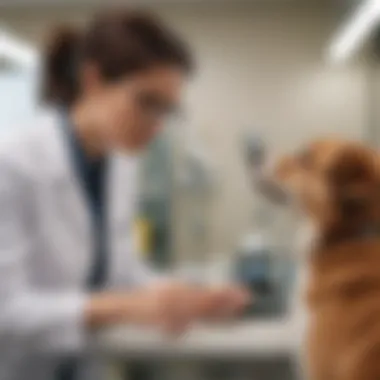Understanding Severe Diarrhea in Dogs: Causes & Care


Intro
Understanding severe diarrhea in dogs is critical for pet owners. This condition is not just a minor inconvenience; it can be indicative of serious health issues. Knowing the causes, symptoms, and effective management strategies is essential for ensuring the well-being of your canine companion. This article provides a comprehensive guide on how to approach severe diarrhea in dogs, highlighting key points that will assist pet owners in recognizing and responding to this distressing symptom.
Understanding Your Pet
Breed Traits
Not all dog breeds are equally susceptible to gastrointestinal issues. Some breeds, like French Bulldogs and Boxers, are known for having sensitive stomachs. This sensitivity can lead to issues such as food allergies or intolerances, which may result in diarrhea. It is important to be aware of your dog's breed characteristics to anticipate potential health issues.
Common Temperaments
Temperament can also play a role in how a dog reacts to stressors that may cause diarrhea. Dogs that are easily stressed may experience gastrointestinal upset more often than their calmer counterparts. Observe your dog’s behavior in different environments to identify triggers that may lead to gastrointestinal issues.
Special Needs
Some dogs may have special dietary or health needs, making them more vulnerable to severe diarrhea. Age, existing health conditions, and even medication can affect your dog’s digestive system. Keeping detailed records of your dog’s health can help in identifying issues early.
Pet Care Essentials
Nutrition and Feeding Guidelines
A well-balanced diet is vital for maintaining your dog's digestive health. High-quality dog food that meets their nutritional needs can minimize the risk of diarrhea. It's important to transition your dog gradually to new foods to prevent gastrointestinal upset.
- Avoid table scraps: Human food can trigger diarrhea.
- Monitor portion sizes: Overeating can lead to digestive issues.
Grooming Tips and Techniques
Regular grooming can help you monitor your dog's skin and fur for signs of health problems. A clean dog is generally healthier, and good hygiene supports their overall well-being.
Health and Wellness
Regular check-ups with a veterinarian are crucial. Vaccinations, parasite control, and routine health screenings can help prevent conditions that lead to diarrhea. Stay informed about preventative measures you can take for your dog's health.
Training and Behavior
Basic Training Techniques
Training your dog to respond to commands can create a sense of stability and security, which may help reduce stress-related gastrointestinal issues. Basic commands enhance your dog's confidence and prevent behavioral problems that may arise from anxiety.
Behavioral Problems and Solutions
Addressing behavioral issues swiftly can prevent stress-related gastrointestinal disorders. For instance, if your dog shows signs of anxiety, consult with a behaviorist or your veterinarian for appropriate strategies.
Mental Stimulation Activities
Engaging your dog with mentally stimulating activities can reduce anxiety and prevent stress-induced diarrhea. Toys that challenge your dog's mind, puzzles, or basic agility courses can keep them focused and fulfilled.
Engaging with Your Pet
Interactive Games and Toys
Select games and toys that challenge your dog's instincts and provide entertainment. Interactive toys can both stimulate their minds and help them burn off excess energy, reducing anxiety levels.
Safe Outdoor Activities
Regular outdoor activities are also beneficial. Ensure the environment is safe and free from hazards. Walks in a secure area help promote physical health and improve your dog's mood.
Family-Friendly Pet Interactions
Encouraging positive interactions between family members and the pet can create a supportive atmosphere. Ensure all interactions are supervised and involve appropriate handling techniques to reduce stress for the dog.
Pet Adoption and Integration
Choosing the Right Pet for Your Lifestyle
When adopting a dog, consider your lifestyle and the dog’s needs. Active families might prefer a high-energy breed, while seniors might be better suited for calmer, low-energy dogs. Understanding both your lifestyle and dog traits will aid in a successful match.


Preparing Your Home for a New Pet
Before bringing a new dog home, prepare by clearing any potential hazards. Create a designated space with food, water, and a comfortable bed. This helps your new pet feel safe and secure as they adjust.
Tips for Smooth Foreword
Introduce your new pet to family members slowly to create a calm environment. Monitor all interactions, especially during the first few days. Gradual introductions can mitigate stress and prevent potential issues.
Understanding these aspects of pet care can help reduce the impact of severe diarrhea and ensure a happy, healthy life for your dog.
Foreword to Severe Diarrhea in Dogs
Severe diarrhea in dogs is a condition that pet owners should approach with seriousness. Diarrhea can have numerous causes and can quickly lead to dehydration and other health issues if not properly managed. Understanding this topic is essential not only for immediate care but also for prevention in the future.
It is important to recognize the signs of severe diarrhea and understand the underlying factors that contribute to it. Many pet owners might assume that diarrhea is just a minor inconvenience, but this perspective can lead to neglecting potential health concerns.
To delve deeper into this topic, we will define severe diarrhea, explore the canine digestive system, and highlight what every pet owner should know to effectively manage this condition.
Defining Severe Diarrhea
Severe diarrhea is often characterized by stool that is more liquid than normal, occurring frequently over a short period. It can be caused by different factors such as infections, sudden changes in diet, or even stress. The severity of diarrhea can vary, meaning that what is severe for one dog may be mild for another.
It is necessary to consider the frequency and consistency of the stools. If your dog is having more than three loose stools in a day, it is advisable to seek veterinary help. The term 'severe' indicates that the condition could potentially lead to serious health problems if not addressed promptly.
Understanding the Normal Canine Digestive System
To better comprehend severe diarrhea, it is crucial to first understand how a normal canine digestive system functions. A dog's digestive tract typically processes food through a series of stages that includes ingestion, digestion, absorption, and elimination.
Food enters through the mouth, is chewed and mixed with saliva, and then travels down the esophagus to the stomach. In the stomach, food is mixed with enzymes and acids, which start breaking down the nutrients. The small intestine further digests food and absorbs nutrients, while the large intestine absorbs water and forms solid waste.
Any disruption in this process, whether caused by dietary changes, intolerances, or health issues, can lead to diarrhea. Understanding how this system operates helps identify what may trigger severe diarrhea and outlines the importance of monitoring your dog's digestive health.
Common Causes of Severe Diarrhea
Understanding the common causes of severe diarrhea in dogs is vital. This section sheds light on why knowing these causes can help pet owners manage their dog's health more effectively. Recognizing the underlying factors allows for timely interventions, preventing complications that could arise from untreated diarrhea.
Infections and Parasites
Infections caused by bacteria, viruses, and parasites are among the leading causes of severe diarrhea in dogs. Examples include parvovirus, coronaviruses, and Giardia. These pathogens can disrupt the digestive tract, leading to significant fluid loss and health risks. Rapid identification and treatment are crucial. If not addressed, infections can escalate, resulting in prolonged diarrhea and possible dehydration. Pet owners should be vigilant about vaccination and regular fecal checks as preventative measures to reduce the risk of such infections.
Dietary Changes and Food Intolerances
Dietary changes can be a double-edged sword. Switching to a new food or introducing new treats can cause gastrointestinal upset in some dogs. Food intolerances or allergies can also lead to severe diarrhea. For instance, ingredients like gluten or certain proteins may trigger a reaction. It's essential to monitor any dietary adjustments closely. If diarrhea occurs after a switch, reverting to the previous food may help alleviate symptoms. Gradual transitions between foods are recommended to reduce the likelihood of upsetting a dog's stomach.
Toxin Ingestion
Toxin ingestion is another critical cause behind severe diarrhea. Dogs are curious creatures and often consume harmful substances. Common culprits include chocolate, grapes, certain plants, and household chemicals. If a dog ingests a toxin, diarrhea can be a symptom of a more severe condition. Immediate veterinary consultation is necessary. Owners should keep harmful substances out of reach and be aware of what items may pose a risk. Recognizing potential toxins can prevent health emergencies related to diarrhea.
Underlying Health Issues
Several underlying health issues can contribute to severe diarrhea. These include diseases that affect overall digestive health. Understanding these conditions is paramount. It assists owners in recognizing the severity of the situation and seeking appropriate management.
Pancreatitis
Pancreatitis can significantly impact a dog’s digestion. This condition occurs when the pancreas becomes inflamed and unable to function properly. One key characteristic of pancreatitis is the sudden onset of severe abdominal pain and diarrhea. For this article, discussing pancreatitis is beneficial, as it highlights a less commonly considered cause of gastrointestinal distress. Its unique aspect is how it can be triggered by high-fat diets, which may not be obvious to all pet owners. Recognizing its signs early can greatly improve outcomes and steer treatment strategies effectively.
Inflammatory Bowel Disease
Inflammatory Bowel Disease (IBD) is a chronic condition that affects a dog's intestines. It can result in severe diarrhea among other symptoms. A distinguishing feature of IBD is persistent digestive issues that can last for weeks or months. This aspect makes it a significant focus for this article, as owners may overlook the long-term impacts of this condition. Knowing the signs can aid in managing their dog's health more effectively. Addressing IBD often requires dietary management and medical consultation, emphasizing the importance of a tailored approach to treatment.
Tumors
Tumors in the gastrointestinal tract can also lead to severe diarrhea. While not very common, they represent a serious concern. Dogs with tumors may experience a range of symptoms, including unexplained weight loss and a sudden change in bowel habits. Discussing tumors here is essential as they can be life-threatening. Understanding that these signs may indicate a severe underlying health issue can prompt immediate veterinary investigation, leading to timely diagnosis and potentially life-saving treatments.
Identifying Symptoms of Severe Diarrhea
Identifying symptoms of severe diarrhea in dogs is vital. Clear understanding can help pet owners take timely action. This section discusses types of diarrhea and accompanying symptoms that warrant attention. Knowing these can aid in effective management, ensuring the well-being of the dog.


Types of Diarrhea
Acute Diarrhea
Acute diarrhea usually appears suddenly and lasts for a short duration. It is often linked to dietary indiscretion or infections. The key characteristic is its sudden onset and usually resolves itself within a few days. Acute diarrhea can be a beneficial aspect of this article, as it often prompts immediate response from owners.
The unique feature of acute diarrhea is that it can often be self-limiting. This means that dogs sometimes recover without any treatment. However, the suddenness can cause stress for both the pet and the owner, highlighting the need for awareness regarding the condition.
Chronic Diarrhea
Chronic diarrhea lasts for weeks or longer. It can be a sign of underlying health issues, making it crucial to identify early. Its persistent nature makes chronic diarrhea a popular mention in discussions about canine gastrointestinal health. The consistent nature is its key feature, drawing attention to potential health concerns.
The challenges with chronic diarrhea include the necessity for diagnostic testing to determine the underlying cause. This can be exhausting and expensive but is important for proper management. Owners should be aware that chronic diarrhea may indicate a much graver condition, requiring immediate veterinary attention.
Accompanying Symptoms to Monitor
Vomiting
Vomiting is an important symptom that often accompanies diarrhea. It can suggest that the dog is dealing with more than just digestive upset. The characteristic of vomiting is that it typically occurs alongside diarrhea, signifying potential infections or toxins in the system. This aspect is key for this article, as it alerts owners to take the situation more seriously.
The unique feature of vomiting is the potential for dehydration. Dogs that vomit while having diarrhea may not be able to keep fluids down, which can worsen their health. Monitoring this alongside diarrhea is essential for deciding the need for veterinary attention.
Lethargy
Lethargy is another significant symptom to notice. It indicates the dog's decreased energy levels. The primary concern with lethargy is that it often suggests that the dog is unwell. This makes it a vital point in assessing the situation. Lethargy can be a red flag in the context of diarrhea, indicating that the dog might be uncomfortable or in pain.
The unique aspect of lethargy is its direct link to the overall health status of the dog. A lethargic dog may not respond to usual stimuli, warranting an immediate examination by a vet.
Dehydration
Dehydration is a serious consideration in a dog with diarrhea. It occurs when the dog loses more fluids than it takes in. The key characteristic is the rapid onset, especially in cases of severe diarrhea. Dehydration is crucial because if left untreated, it can lead to more serious health issues.
The unique feature of dehydration in dogs is that it can develop quickly. Signs may include dry gums, excessive thirst, or decreased skin elasticity. Recognizing these symptoms is essential to prevent complications that may arise from prolonged diarrhea.
Timely recognition of symptoms is critical for effective management of diarrhea in dogs.
The Importance of Early Diagnosis
Timely identification of severe diarrhea in dogs is crucial for effective management. This condition can lead to more than just discomfort; it can pose significant health risks if not addressed promptly. Recognizing symptoms early allows for swift veterinary action, which can ultimately mitigate severe complications.
When to Consult a Veterinarian
If a dog experiences diarrhea that lasts more than 24 hours, it is advisable to consult a veterinarian. Other indicators include the presence of blood in the stool, severe lethargy, vomiting, or signs of dehydration. These symptoms can be warning signs of a more serious underlying issue. Additionally, young puppies or older dogs are particularly vulnerable. Their immune systems may not handle the stress of prolonged gastrointestinal distress well. As a responsible pet owner, being vigilant about these signs is essential.
Diagnostic Tests and Procedures
Understanding the diagnostic process can help owners prepare for a veterinary visit. Here are key tests that might be employed to understand the underlying causes of severe diarrhea.
Stool Tests
Stool tests play an essential role in diagnosing the cause of diarrhea. They help detect various pathogens, such as bacteria, viruses, or parasites that might be causing gastrointestinal disturbance. One key characteristic of stool tests is their non-invasive nature. They allow for quick collection and analysis of the dog's feces, making them a beneficial choice in initial diagnostics. The unique feature of stool tests is their ability to identify specific infectious agents, which facilitates targeted treatment. However, they have limitations, such as not providing information on structural abnormalities or certain systemic diseases.
Blood Tests
Blood tests are comprehensive and provide insights into the overall health of the dog. These tests can reveal dehydration levels, organ function, and immune response. A key characteristic of blood tests is their capacity to assess multiple health aspects simultaneously. This is a beneficial choice when determining the severity of dehydration and other systemic issues. Unique features include the ability to identify inflammations or infections. However, blood tests require more advanced equipment and expertise, making them slightly more invasive compared to stool tests.
Imaging Techniques
Imaging techniques, such as X-rays or ultrasounds, may be employed if initial tests are inconclusive. These methods allow veterinarians to visualize internal structures and identify issues like blockages or tumors. A highlighted characteristic of imaging techniques is their capability to provide a non-invasive look at a dog's internal health. This provides valuable information that cannot be obtained from stool or blood tests alone. Imaging techniques come with higher costs and require specialized equipment, which can be a disadvantage for some pet owners.
Early diagnosis and intervention are crucial for ensuring the successful treatment of severe diarrhea in dogs.
Management Strategies for Severe Diarrhea
Managing severe diarrhea in dogs is crucial for their overall health and well-being. This aspect of care ensures that pet owners recognize the significance of immediate action and continuous monitoring. Effective management strategies not only address the immediate symptoms but also aim to identify underlying causes and prevent recurrence. It is important for pet owners to be well-informed about dietary management and appropriate medications.
Dietary Management


A dog’s diet plays a vital role in managing severe diarrhea. Knowing what food can aid recovery is key for owners.
Understanding the Role of Hydration
Hydration is indispensable. When dogs experience diarrhea, they can quickly become dehydrated. This condition can worsen quickly without adequate fluid intake. Ensuring continuous availability of fresh water is essential. In severe cases, electrolyte solutions designed for pets can be beneficial. Administering such solutions can replenish essential minerals and fluids, aiding recovery.
Hydration can also improve overall digestive health, making it a critical point in dietary management. The bodily systems rely on water to function optimally, including the digestive tract. Thus, ensuring that pets remain hydrated is a straightforward yet effective way to address the impacts of diarrhea. However, owners must monitor their dog’s intake. Overhydration, although less common, can happen and should be watched carefully.
Implementing a Bland Diet
For many dogs suffering from diarrhea, a bland diet can offer relief and stabilization. This diet typically includes plain boiled rice, boiled chicken without skin, or canned pumpkin. The simplicity of these foods allows the digestive system to rest while still providing essential nutrients.
The key characteristic of a bland diet is its easily digestible nature. This makes it a popular choice among veterinarians. Additionally, the inclusion of fiber, especially from canned pumpkin, can help firm up stools. However, it is crucial for owners to introduce this diet gradually to avoid additional stress on the digestive system.
It is also worthwhile to note that a bland diet is usually a temporary measure. It should be supplemented with nutritional input once a dog begins to recover. This transition must be gradual to avoid upsetting the stomach further. Monitoring the dog’s reaction to the bland diet will guide when it is appropriate to introduce regular food again.
Medications and Treatments
Outside dietary management, medications and treatments play a significant role in treating severe diarrhea in dogs. Understanding the available options is beneficial.
Probiotics
Probiotics are beneficial bacteria that support digestive health. They help restore the natural balance of gut flora disrupted by diarrhea. Probiotics can significantly contribute to recovery by enhancing nutrient absorption and improving bowel regularity.
Their popularity stems from their safety and efficacy. Many pet owners find them easy to administer, often available in chewable form or as a powder that can be mixed with food. However, not all probiotics are created equal, and consulting with a veterinarian is recommended to find a suitable option.
Antibiotics
In some cases, antibiotics may be necessary, particularly if a bacterial infection is determined to be the cause of diarrhea. They target harmful bacteria, aiding in the resolution of underlying infections. However, the use of antibiotics should be approached cautiously, as they can disrupt healthy gut flora, which exacerbates digestive issues.
An important feature of antibiotics is their ability to provide rapid relief when appropriate. Nonetheless, responsible use is essential, and they should only be given under veterinary supervision to avoid complications or resistance.
Anti-inflammatory Medications
Inflammatory conditions can lead to severe diarrhea, and anti-inflammatory medications can significantly help in these cases. They reduce inflammation in the gastrointestinal tract and relieve discomfort associated with inflammation.
These medications are useful for dogs diagnosed with underlying conditions like inflammatory bowel disease. However, it is crucial to adhere to prescribed dosages and monitor any side effects. Consulting with a veterinarian regarding the appropriate medication can ensure the most effective treatment.
Effective management results in quicker recovery times and ensures your dog remains comfortable during the healing process.
Preventative Measures for Diarrhea
Preventative measures for diarrhea are crucial in maintaining the overall health of dogs. Understanding how to minimize risks can help pet owners avoid severe gastrointestinal distress. Proactive steps can significantly reduce the likelihood of dog experiencing diarrhea. It is essential to understand what factors contribute to this condition and how to mitigate them through efficient management practices.
Feeding Guidelines
Feeding guidelines play a significant role in preventing severe diarrhea in dogs. A dog’s diet directly impacts its digestive health. Here are key points to consider:
- High-Quality Food: Choose a premium dog food with high-quality ingredients. Avoid fillers and artificial additives that may irritate the digestive system.
- Consistent Feeding Schedule: Feed dogs at regular intervals. Consistency helps maintain a healthy digestive rhythm. Changes in feeding times can lead to digestive upset.
- Gradual Food Changes: When switching dog foods, do it gradually. Mix new food with the old one over several days to prevent any sudden reactions in their digestive system.
- Monitoring Allergies: Some dogs have food allergies or intolerances. Be observant of any adverse symptoms and consult a veterinarian if necessary.
Maintaining a Clean Environment
A clean environment is vital for the prevention of diarrhea in dogs. It may seem simple, but proper hygiene can reduce the exposure to pathogens.
- Regular Cleaning: Clean feeding areas and water bowls regularly. Bacteria can thrive in unclean environments.
- Safe Waste Disposal: Promptly dispose of dog waste to prevent contamination and reduce the risk of infections.
- Controlled Outdoor Access: Monitor your dog’s time outside, particularly in public places. Dogs can encounter bacteria and parasites in shared environments.
- Veterinary Check-ups: Regular vet visits ensure that any underlying issues are caught early. Vaccinations can also protect against specific infectious diseases that may cause diarrhea.
“Prevention is always better than cure. A few small steps can save a dog from severe health issues.”
Culmination
Severe diarrhea in dogs is a condition that requires careful attention and management. Understanding the implications of this issue is crucial for pet owners. Early recognition of the symptoms, proper diagnosis, and timely veterinary intervention can prevent further complications and ensure recovery. This article has explored various aspects of severe diarrhea, covering common causes, symptoms, diagnostic tests, and effective management strategies.
The importance of this topic extends beyond mere knowledge. It empowers dog owners to take proactive steps in maintaining their pets' health. Awareness of dietary needs and hygiene practices can significantly reduce the risk of diarrhea incidence. Recognizing when to seek veterinary advice is also vital, as some underlying conditions may require immediate attention.
In summary:
- Early Detection: Identifying symptoms early improves outcomes.
- Timely Intervention: Consulting a veterinarian can help manage underlying causes.
- Preventative Care: Establishing healthy habits can minimize risks.
Overall, ensuring that a dog has proper care and attention during episodes of severe diarrhea enhances its quality of life. Pet owners who understand the nuances of this condition are better equipped to provide a nurturing environment for their dogs.
Key Takeaways
- Severe diarrhea can have multiple causes, including infections, dietary changes, and health issues.
- Symptoms require careful monitoring; signs like vomiting and lethargy may indicate severity.
- Consultation with a vet is essential for accurate diagnosis and treatment.
- Management includes dietary adjustments and possible medication.
- Preventative measures, such as maintaining cleanliness and following feeding guidelines, are crucial to reduce incidence.
Understanding these key points ensures that dog owners can confidently navigate the complexities of severe diarrhea, promoting the well-being of their beloved pets.



